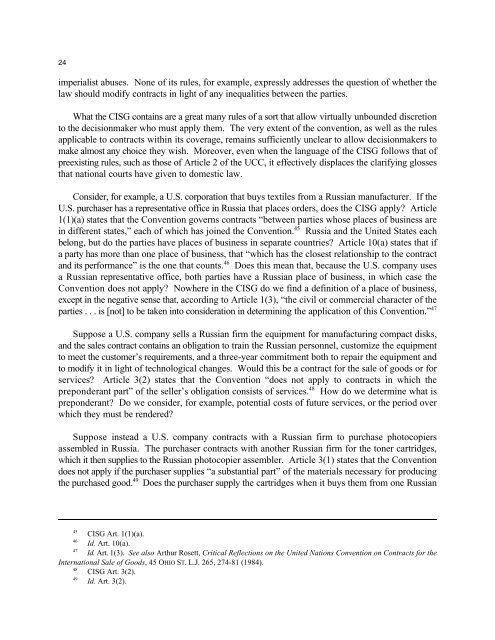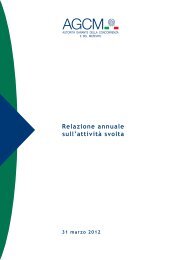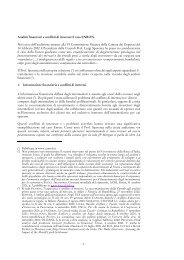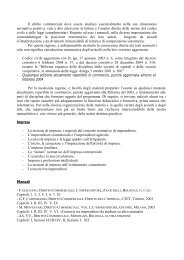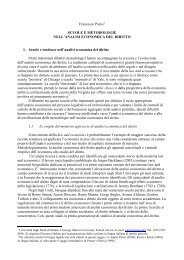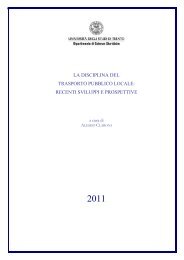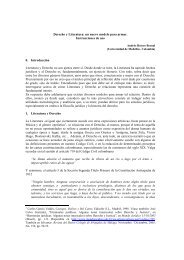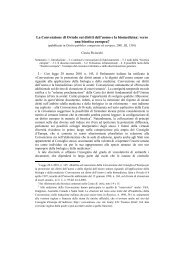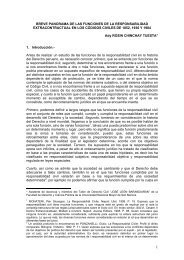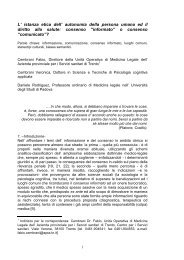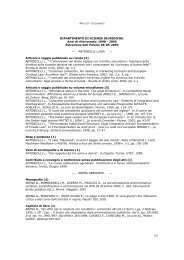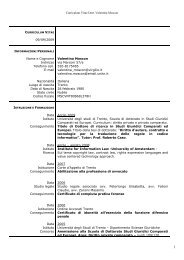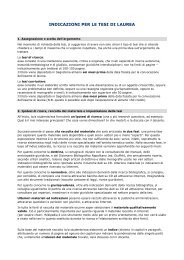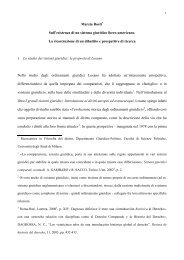The Futility of Unification and Harmonization in International ...
The Futility of Unification and Harmonization in International ...
The Futility of Unification and Harmonization in International ...
Create successful ePaper yourself
Turn your PDF publications into a flip-book with our unique Google optimized e-Paper software.
24imperialist abuses. None <strong>of</strong> its rules, for example, expressly addresses the question <strong>of</strong> whether thelaw should modify contracts <strong>in</strong> light <strong>of</strong> any <strong>in</strong>equalities between the parties.What the CISG conta<strong>in</strong>s are a great many rules <strong>of</strong> a sort that allow virtually unbounded discretionto the decisionmaker who must apply them. <strong>The</strong> very extent <strong>of</strong> the convention, as well as the rulesapplicable to contracts with<strong>in</strong> its coverage, rema<strong>in</strong>s sufficiently unclear to allow decisionmakers tomake almost any choice they wish. Moreover, even when the language <strong>of</strong> the CISG follows that <strong>of</strong>preexist<strong>in</strong>g rules, such as those <strong>of</strong> Article 2 <strong>of</strong> the UCC, it effectively displaces the clarify<strong>in</strong>g glossesthat national courts have given to domestic law.Consider, for example, a U.S. corporation that buys textiles from a Russian manufacturer. If theU.S. purchaser has a representative <strong>of</strong>fice <strong>in</strong> Russia that places orders, does the CISG apply? Article1(1)(a) states that the Convention governs contracts “between parties whose places <strong>of</strong> bus<strong>in</strong>ess are45<strong>in</strong> different states,” each <strong>of</strong> which has jo<strong>in</strong>ed the Convention. Russia <strong>and</strong> the United States eachbelong, but do the parties have places <strong>of</strong> bus<strong>in</strong>ess <strong>in</strong> separate countries? Article 10(a) states that ifa party has more than one place <strong>of</strong> bus<strong>in</strong>ess, that “which has the closest relationship to the contract46<strong>and</strong> its performance” is the one that counts. Does this mean that, because the U.S. company usesa Russian representative <strong>of</strong>fice, both parties have a Russian place <strong>of</strong> bus<strong>in</strong>ess, <strong>in</strong> which case theConvention does not apply? Nowhere <strong>in</strong> the CISG do we f<strong>in</strong>d a def<strong>in</strong>ition <strong>of</strong> a place <strong>of</strong> bus<strong>in</strong>ess,except <strong>in</strong> the negative sense that, accord<strong>in</strong>g to Article 1(3), “the civil or commercial character <strong>of</strong> theparties . . . is [not] to be taken <strong>in</strong>to consideration <strong>in</strong> determ<strong>in</strong><strong>in</strong>g the application <strong>of</strong> this Convention.” 47Suppose a U.S. company sells a Russian firm the equipment for manufactur<strong>in</strong>g compact disks,<strong>and</strong> the sales contract conta<strong>in</strong>s an obligation to tra<strong>in</strong> the Russian personnel, customize the equipmentto meet the customer’s requirements, <strong>and</strong> a three-year commitment both to repair the equipment <strong>and</strong>to modify it <strong>in</strong> light <strong>of</strong> technological changes. Would this be a contract for the sale <strong>of</strong> goods or forservices? Article 3(2) states that the Convention “does not apply to contracts <strong>in</strong> which the48preponderant part” <strong>of</strong> the seller’s obligation consists <strong>of</strong> services. How do we determ<strong>in</strong>e what ispreponderant? Do we consider, for example, potential costs <strong>of</strong> future services, or the period overwhich they must be rendered?Suppose <strong>in</strong>stead a U.S. company contracts with a Russian firm to purchase photocopiersassembled <strong>in</strong> Russia. <strong>The</strong> purchaser contracts with another Russian firm for the toner cartridges,which it then supplies to the Russian photocopier assembler. Article 3(1) states that the Conventiondoes not apply if the purchaser supplies “a substantial part” <strong>of</strong> the materials necessary for produc<strong>in</strong>g49the purchased good. Does the purchaser supply the cartridges when it buys them from one Russian45CISG Art. 1(1)(a).46Id. Art. 10(a).47Id. Art. 1(3). See also Arthur Rosett, Critical Reflections on the United Nations Convention on Contracts for the<strong>International</strong> Sale <strong>of</strong> Goods, 45 OHIO ST. L.J. 265, 274-81 (1984).48CISG Art. 3(2).49Id. Art. 3(2).


